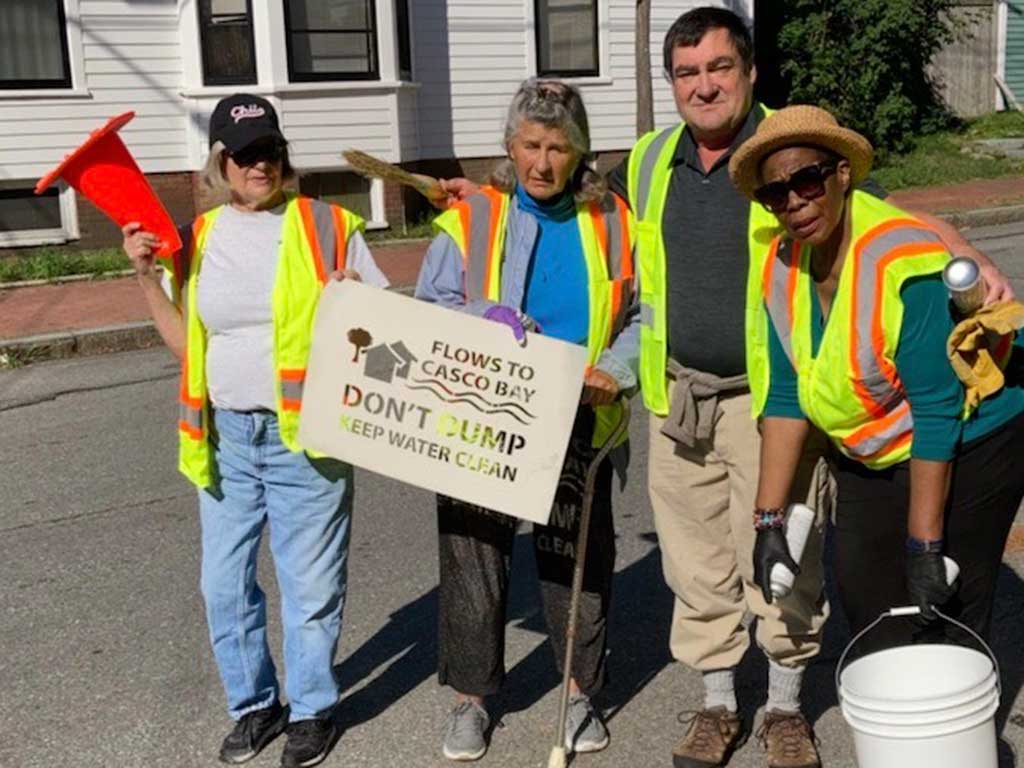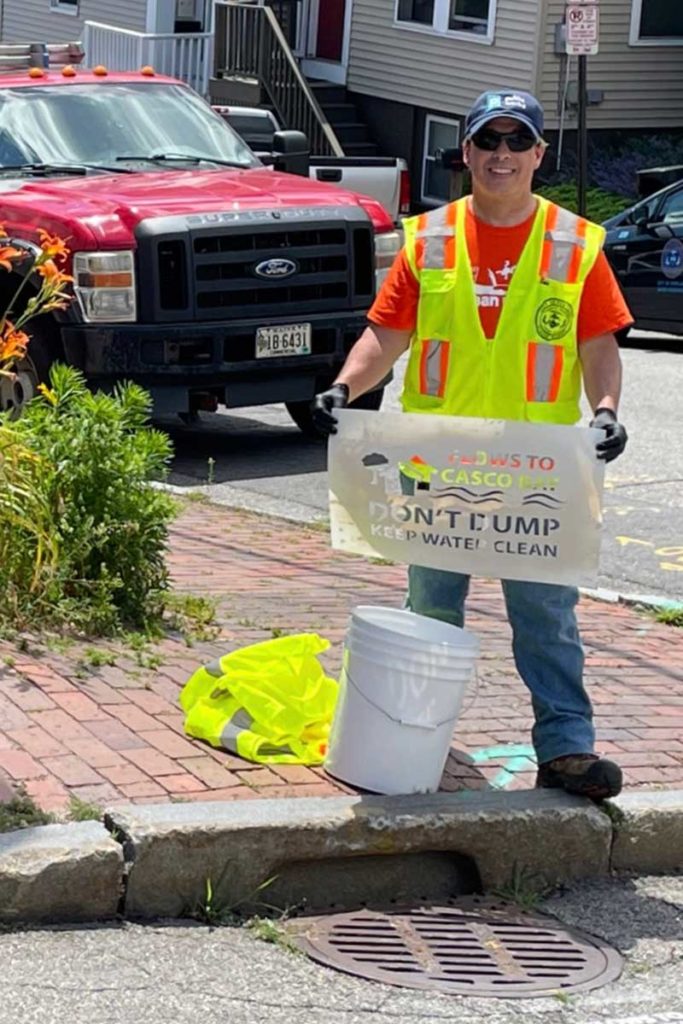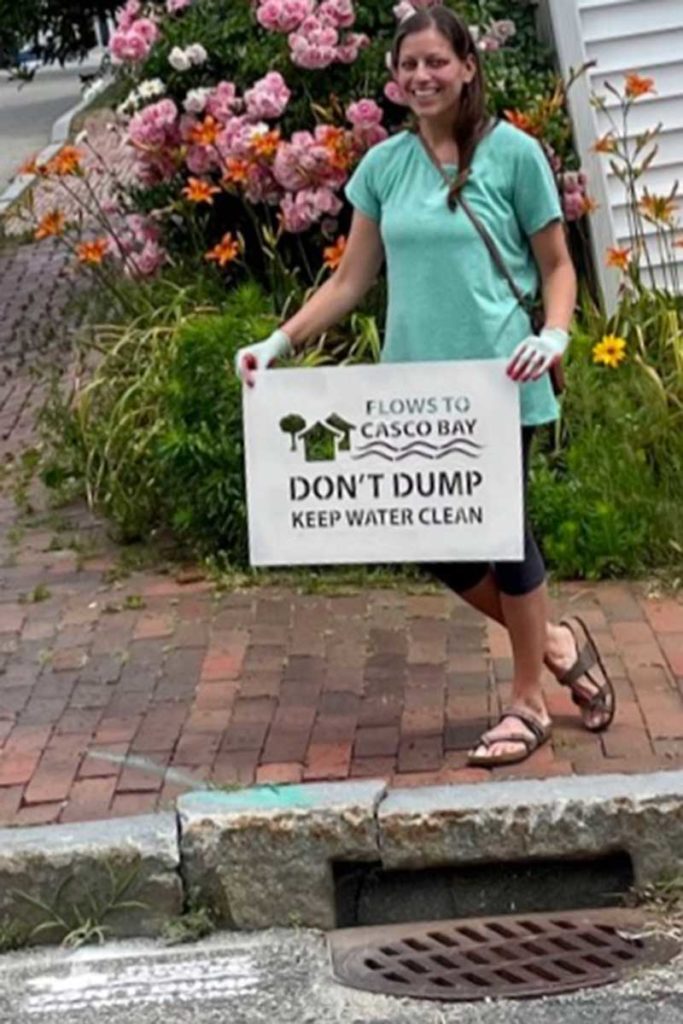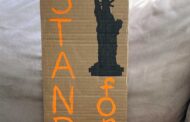La Vida Local
Irregular Notes on West End Life
By Rosanne Graef

-All photos courtesy of Rosanne Graef
Water is Life
Do Your Bit to Take Care of It
If you’ve walked around the West End lately, you may have noticed the above message stenciled on the pavement next to storm drains. The West End Neighborhood Association (WENA) aims to stencil all the drains in our area by the end of September. WENA was looking for a way to get neighbors together by doing something outdoors. Storm drain stenciling fits the bill—it’s constructive, social, and fun! The project originated with the Friends of Casco Bay and the City of Portland’s Water Resources Department. Doug Roncarati, Portland’s Stormwater Program Coordinator, trained a group of volunteers in late June and we got underway on July 8th.
I know I have trouble following the massive amount of construction that’s been happening the past few years with projects related to stormwater runoff, combined sewage, the East End Treatment Plant… I decided to take the opportunity to ask Doug some questions. His {lightly edited} responses below are enlightening and thought-provoking.
Doug Roncarati on Portland’s Stormwater Projects
Can you explain the stormwater separation project? The stormwater will go into storage tanks, right? Are those all at Back Cove? Will the stormwater eventually go through the treatment plant on the East End?

It is a Combined Sewer Overflow (CSO) abatement project that will collect millions of gallons of combined sewage (i.e.: residential/commercial/industrial waste plus stormwater runoff) from multiple combined sewer pipes and temporarily store it in order to prevent several CSOs from activating and discharging untreated, combined sewage to Back Cove during heavy rain events.
CSOs are engineered “pressure relief valves” that activate when heavy precipitation overwhelms the combined sewer system, which normally conveys wastewater and modest amounts of stormwater runoff to the East End Treatment Plant for processing. On the plus side these CSOs help to prevent combined sewage from backing up into the streets and allow some additional runoff to enter the combined sewers, thereby reducing street flooding. However, they discharge significant amounts of untreated wastewater and stormwater runoff to our coastal waters.
The City has been using two approaches to eliminate and/or reduce CSO discharges: Sewer separation and “store and treat” systems. Sewer separation is just what it sounds like: Install separate pipes to collect and convey the stormwater runoff and wastewater, thus removing a lot of stormwater from the overburdened combined sewer collection system. This approach increases the capacity of the remaining combined sewer collection system, helping it to more effectively convey the sewage to the treatment plant.
However, the separated stormwater is still discharged to coastal waters untreated. Even without the wastewater, stormwater runoff can pick up a lot of pollution from our built landscape, such as petroleum products, sediment, fertilizers/pesticides, heavy metals… The City is implementing a variety of stormwater pollution prevention measures and installing treatment systems like underdrained soil filters, tree box filters, gravel wetlands, hydrodynamic separators, and baffle boxes, to reduce the impact of operating our stormwater management systems.
The second approach to CSO abatement is storage and treatment, of which the Back Cove and Baxter Boulevard projects are good examples. Instead of installing separate storm drain and sewage pipes, we are often able to achieve similar results by temporarily collecting the combined sewage in a large holding tank, then as the precipitation subsides and the combined sewer collection system (and treatment plant) can handle it again, the combined sewage is conveyed on to the treatment plant for processing.
What three items are the biggest problem when they’re tossed down a storm drain?
Anything other than rain and snowmelt should never be dumped into a storm drain/catch basin. Seriously though, illegal dumping of waste oil and cooking oil/grease are very challenging. Construction wastes such as paint, concrete/drywall, compound/grout residue, or wash water are very problematic. Illegal dumping of pet waste bags is a growing challenge because of the bacteria, nutrients (nitrogen & phosphorus), and trash they introduce to our systems.
We got a call from a resident complaining that the catch basin in front of his house smelled like sewage. When our crew arrived to investigate, they found that the catch basin was full of festering pet waste bags that had been illegally dumped by neighbors and community members every time they took their dog for a walk. The resident was outraged that people were doing this and he became a motivated “watch dog-owner,” telling people why they shouldn’t dump pet waste bags down storm drains (especially in front of his home) and why.
{Author’s Note: Even if someone doesn’t throw a poop bag directly into the drain, one dropped on the sidewalk or tossed into the gutter or bushes is likely to eventually make its way to the drain, just like plastic cups and cigarette butts.}
Are there fines for dumping wastes like motor oil or antifreeze down a storm drain?
Yes, there are several ordinance provisions, including Chapter 32 Stormwater and Chapter 24 Sewers, that prohibit illegal dumping. The fines can be levied per incident and the fine schedule is based on the Maine statutes.
How often do the catch basins get cleaned out? What happens to the gunk that gets hauled out of them? Any idea how much that costs?
Catch basins are typically cleaned out every couple of years on a rotating schedule, depending on their location and how frequently they tend to fill up. The waste is taken to Riverside Recycling Center, where it is evaluated for beneficial reuse or proper disposal. I do not have that figure handy but can tell you that disposal of hundreds of tons of catch basin (and street sweeping debris) is expensive, and the costs are growing because it is getting harder to find facilities able and willing to process and dispose of the material.
Any other info you’d like to get out to the public?

It’s all connected! What we do on the land impacts our streams, ponds, rivers, and coastal waters, which in turn impacts the food we eat, the water we drink, the places where we work and play. Water pollution impacts our health, the health of our environment, and the long-term health of our economy. It is much cheaper to prevent stormwater and water pollution than it is to deal with it after the fact.
Thanks, Doug, that’s certainly a lot to think about!
A Note from WENA:
One of WENA’s goals is the maintenance of our neighborhoods to ensure that they are clean, safe, quiet, and attractive. If you’d like to get involved with the drain stenciling project, please email hello@wenamaine.org and check the WENA website at wenamaine.org to see what else we have going on. Please join us in doing your bit!
Rosanne Graef lives in the West End and is a regular volunteer contributor. Email her at lavidalocalwen@gmail.com.





